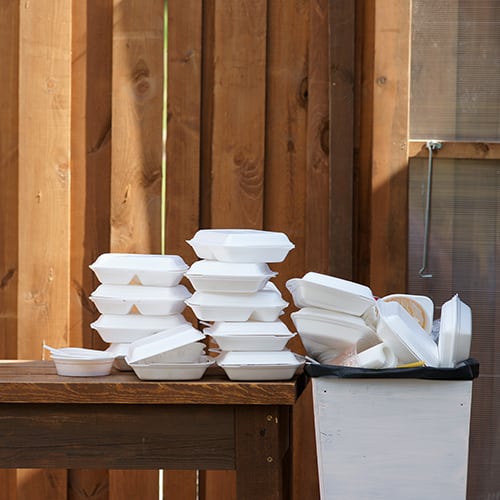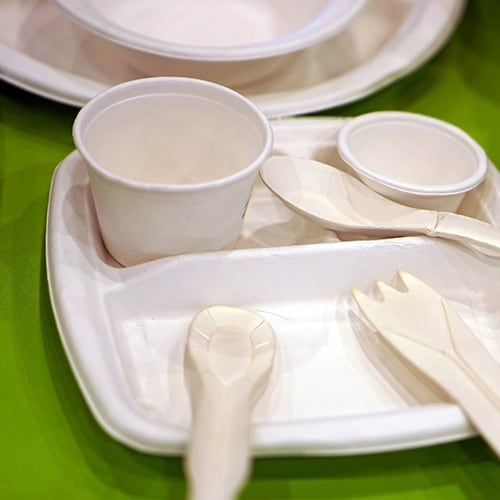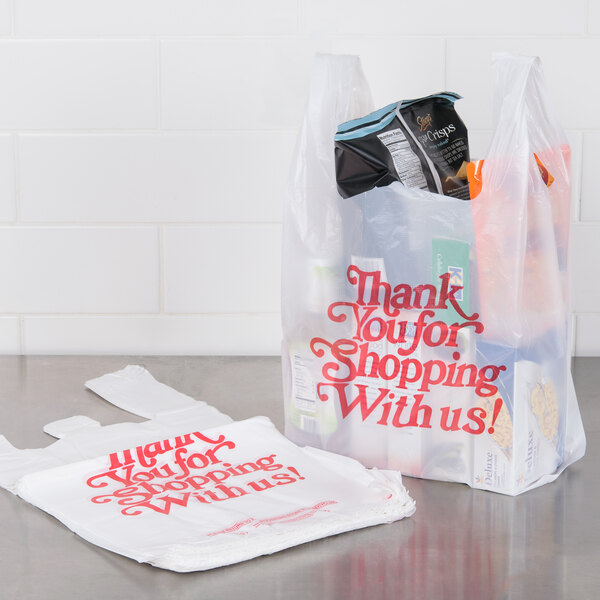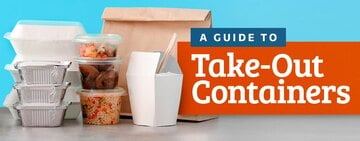Plastic and Styrofoam Bans
Plastic and styrofoam bans have become increasingly prevalent across the United States in recent years. As a foodservice operator, it's crucial to understand the importance of these bans and how they can impact your business. Complying with these bans can help you avoid potential fines and legal issues. By staying informed and proactive, you can navigate the changing landscape of plastic and foam bans and position your business to become more sustainable.
This page has been updated as of January 2024. Because these laws change regularly, readers of this site should be familiar with applicable state laws and restrictions.
Shop All Eco-Friendly DisposablesStyrofoam Bans

Styrofoam, also known as expanded polystyrene foam, is a common material used for takeout containers and cups. Unfortunately, it's slow to break down and can have a significant impact on the environment. Many cities and states have implemented bans on Styrofoam, requiring restaurants to switch to more environmentally friendly alternatives like compostable or recyclable materials.
Styrofoam vs Polystyrene
Styrofoam is a trademarked name by the Dow Chemical Company to describe their closed-cell extruded polystyrene foam. It is often used interchangeably with the term expanded polystyrene (EPS) foam. Styrofoam and EPS foam are typically used in takeout containers, disposable utensils, and coffee cups.
Is Styrofoam Recyclable?
Yes, Styrofoam is recyclable at designated recycling centers. The problem is that few recycling centers across the country accept and recycle Styrofoam. If you aren't sure if the product is made from Styrofoam, look for a recyclable symbol with the number "6."
Recycling centers that accept #6 plastic typically require the product to be clean and dry when it's dropped off at the facility. Despite being recyclable at some locations, the majority of America’s Styrofoam products are placed in landfills, where polystyrene does not break down.
What States Have Banned Styrofoam?
The following states have passed state-wide legislation regarding expanded polystyrene products:
- Colorado
- Delaware (effective 2025)
- Maine
- Maryland
- New Jersey
- New York
- Oregon (effective 2025)
- Rhode Island (effective 2025)
- Vermont
- Virginia (effective July 2028 for large businesses and July 2030 for small businesses)
- Washington (effective June 2024)
- Washington, D.C.
If you don't see your state on this list, you should still check the polystyrene ordinance in your area. Some states, like California and Hawaii, have passed legislation in at least one city or county.
Styrofoam Alternatives

If you live in an area currently affected by a Styrofoam ban, there are plenty of alternatives available to keep your takeout service running smoothly. Learn about environmentally friendly alternatives below or start shopping for eco-friendly takeout container options.
- PET Plastic - Containers made from PET plastic (polyethylene terephthalate) are flexible, lightweight, and recyclable. Many beverage bottles are made from PET because it is clear and resistant to cracking. You can also find PET deli containers that are ideal for packaging takeout items like soups, salads, and sides.
- PLA Plastic - The unique thing about PLA plastic (polylactic acid) is that it's made from renewable resources like sugar cane, corn starch, or sugar beets. Try using PLA plastic cups in place of styrofoam to-go cups.
- Paper/Double Poly-Coated Paper - Double poly-coated products combine eco-friendly paper construction with a moisture-resistant coating. Some coated products do contain forever chemicals called PFAS, so look for the "No PFAS Added" label when shopping.
- Plant Fiber - Plant fiber disposable products are lightweight and commercially compostable at proper processing facilities. Use liquid-resistant and microwave-safe plant fiber disposables to package deliveries and takeout orders.
- Post-Consumer Paperboard - Have you ever wondered where the paper in your recycling bin ends up? The material used to create post-consumer paperboard products comes from recycled paper fibers.
- Reusable Polypropylene Containers - Takeout containers made from recyclable polypropylene feature a durable, synthetic resin construction perfect for multiple-use applications.
Plastic Bag Bans
Many cities and states have implemented bans on plastic bags, requiring businesses to switch to reusable or paper alternatives. These bans aim to reduce the environmental impact of single-use plastic bags, which can take hundreds of years to decompose. As a restaurant owner, consider investing in reusable bags for takeout orders or offering paper bags as an alternative. It's also a good idea to educate your staff and customers about the importance of these bans and provide incentives for customers to bring their own bags.
What States Have Banned Plastic Bags?

If you live in one of the following states, be aware that your business is affected by state-wide legislation regarding plastic bags:
- California
- Colorado
- Connecticut
- Delaware
- Hawaii
- Maine
- New Jersey
- New York
- Oregon
- Rhode Island
- Vermont
- Virginia (affects state agencies, colleges, and universities only)
- Washington
If you don't see your state on this list, you should still check the plastic bag ordinance in your area. Many states, like Alaska and New Mexico, have passed legislation in at least one city or county.
Plastic Bag Alternatives
If you're looking for an alternative to single-use plastic bags, there are many options available.
- Paper Bags - Stock paper bags instead of plastic bags for packaging takeout orders, retail purchases, and groceries.
- Reusable Bags - Reusable bags are considered the most environmentally friendly method of packaging goods.
- Food Boxes - Try skipping the bag altogether and using large takeout boxes with handles to package smaller items.
Plastic Straw Bans
Plastic straw bans began popping up in Massachusetts in 2015 but didn't hit mainstream news until Seattle became the largest US city to enact a straw ban in 2018. Supporters of plastic straw bans argue that single-use straws have a negative environmental impact, but those opposed to a ban on plastic straws argue that more expensive alternatives will hurt their business’s bottom line.
What States Have Banned Plastic Straws?
These states have passed state-wide legislation regarding the distribution of single-use straws. In many of these states, straws can still be provided to customers by request only.
- California
- Colorado
- New Jersey
- Oregon
- Vermont
- Virginia (affects state agencies, colleges, and universities only)
- Washington
- Washington D.C.
If you don't see your state on this list, you should still check the plastic straw ordinance in your area. Some states, like Florida and Georgia, have passed legislation in at least one city or county.
Plastic Straw Alternatives

If your business currently operates in the affected states above, it may be time to ditch the plastic straws. Thankfully there are many eco-friendly straw alternatives you can use instead of plastic.
- PLA Plastic Straws - Recyclable straws made from PLA look like plastic, but they're compostable at the appropriate facilities and under the right conditions.
- PHA Straws - PHA (polyhydroxyalkanoate) is a bio-based material that can be composted at home, which sets it apart from other compostable materials. Straws made from PHA look and feel like plastic but are more sustainable.
- Paper Straws - Festive paper straws are a colorful option for catered events or special occasions, and they break down easily after use.
- Reusable Straws - Not only can these straws be washed and reused, but they also provide an upselling opportunity. Try offering eco-friendly reusable straws as an add-on item to your beverage menu.
- Edible Straws - Edible straws are a fun option for cold beverages like smoothies, milkshakes, and cocktails. They're made from edible materials that break down easily which makes them a great alternative to plastic straws.
When it comes to operating your foodservice business, it’s important to stay on top of possible legislative action that may affect your operational costs. Styrofoam and plastic are both big parts of takeout and delivery services, so finding an environmentally friendly option that complies with regulations without compromising your bottom line is imperative.



